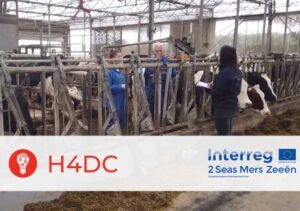H4DC – Health 4 Dairy Cows
This is a European project that aims to decrease the spread of the Cryptosporidium parasite in farms. This protozoan parasite is the cause of Cryptospiridosis, a waterborne disease that affects cattle and humans. By reducing the impact of Cryptosporidiosis in farms, the project aims to increase farm productivity in a number of different countries, making these businesses more efficient and successful, with a lower impact on human health. For this purpose, this project aims to provide pilot farms, detection tools and technological devices that can accelerate the discovery of new drugs at the lowest possible cost.
Project duration: 01-03-2019 to 31-03-2023
Project funding: Total budget: € 3,715,874; ERDF amount: € 2,229,524
Project Objectives
The overall objective is to reduce the sanitary and economic impact of Cryptosporidium using a twofold approach:
- Halve the number of contaminated calves through dissemination of guidance for new breeding practices to pilot farms across the 2-Seas area. These farms will use a parasite detection kit developed by the consortium to identify and evaluate any changes.
- Develop an automated microelectronic device to accelerate therapeutic discovery upon adoption by biopharmaceutical companies.
Expected Outcomes
- Dissemination of 40 pilot farms across the 2 seas area used as reference site for farmers
- Create a low-cost and easy-to-use pilot in-situ parasite detection system, which can be used by farmers as well and produced by biotech companies.
- Adapt an electronic Cryptosporidium-viability monitoring micro-system, applicable as standard to pharmaceutical laboratories to rapidly characterise potentially therapeutic compounds.
- Develop market study linked to business model and strategies to transfer technologies to the end users (biotech/pharmaceutical companies)
University of Kent Contribution and Team
The team at the University of Kent is involved in all aspects of the project with a main focus on the development of the Cryptospiridium in situ detection tool and device for testing potential anti-parasitic compounds.
Team members:
Anastasios Tsaousis, Claudia Avezedo-Ribeiro, Gary Robinson, Mark Smales, Gareth Howells, Konstantinos Sirlantzis, Gianluca Marcelli, Sanaul Hoque
Partners
JUNIA (Lead partner), University of Kent, Inagro, ZLTO, CNRS, University of East Anglia, CVE
